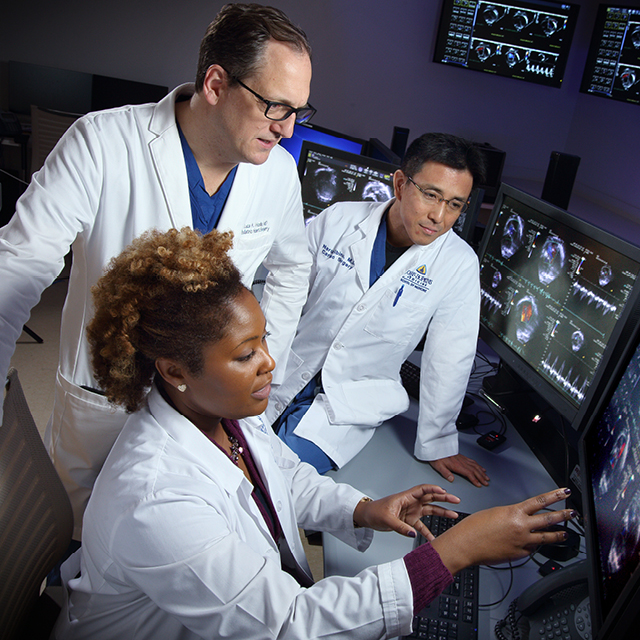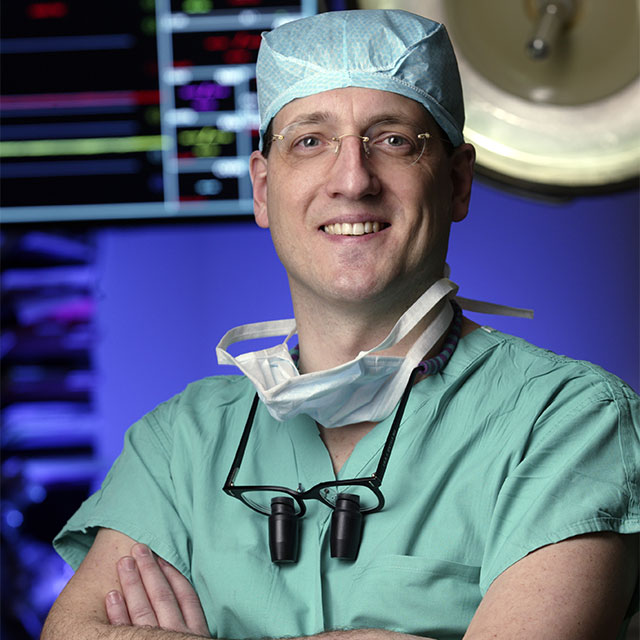Connective tissue disorders can compromise tissues throughout the body, but their most alarming effects are on the cardiovascular system. Conditions such as Marfan syndrome, Loeys-Dietz syndrome and Ehlers-Danlos syndrome often impair the function of the heart and major blood vessels. Children with these disorders can develop dilation of the aorta, particularly the aortic root and arch, which can lead to life-threatening aneurysms and dissections, and chronic valvular problems.
Johns Hopkins has a long, distinguished history of advancing the diagnosis and treatment of connective tissue disorders. For more than three decades, Harry “Hal” Dietz, director of the William S. Smilow Center for Marfan Syndrome, has studied the molecular basis of connective tissue diseases, revealing deep insights that spur novel treatments. Although connective tissue disorders are relatively rare—for example, Marfan syndrome affects roughly one in 10,000 children—Johns Hopkins physicians currently treat more than 1,000 families affected by these conditions, one of the largest clinical practices worldwide to specialize in this area.
Correcting Pediatric Cardiovascular Defects
This legacy of excellence also extends to the surgical suite, where cardiologists and cardiac surgeons at Johns Hopkins have pioneered new ways to correct pediatric cardiovascular defects. Luca Vricella has pushed the frontiers of cardiac surgery for children with connective tissue disorders and other congenital heart conditions. Vricella, who directs pediatric cardiac surgery at the Johns Hopkins Children’s Center, has worked with colleagues to establish a technique first applied in adults, known as aortic valve-sparing root replacement, as a viable approach in pediatric populations.1,2
Preserving patients’ own aortic valves offers distinct advantages, particularly in children with connective tissue disorders who often require aortic root surgery at a relatively early age. For example, if the aortic valve is replaced rather than preserved, these patients would require lifelong anti-coagulation with inherent risks, including thrombosis and hemorrhage. Through these advances and others, including advanced tissue-engineering approaches (see back page), Johns Hopkins has emerged as a global leader in the understanding and treatment of aortic disorders in children, with the goal of removing all tissue at risk of aortic catastrophe while preserving the native aortic valve in the growing child.
A Cross-Disciplinary Clinic Approach
Johns Hopkins physicians’ deep expertise in the cardiovascular aspects of connective tissue disease is complemented by equally deep experience in other clinical domains. World-renowned physicians from diverse specialties come together in a unique, cross-disciplinary clinic, which provides comprehensive, coordinated care for children and families grappling with these conditions. This clinic offers expert care in multiple areas, including cardiology, orthopaedics and ophthalmology. Indeed, patients with connective tissue disease often exhibit multisystem symptoms, so they require a clinical team that is focused on the heart and has wide-ranging, head-to-toe capabilities.
Moreover, connective tissue disorders require lifelong care from physicians with advanced training and experience not only in pediatric specialties, but also in managing these congenital conditions in adults. Johns Hopkins physicians have advanced training in an important and emerging area of medicine—caring for adults with congenital heart disease—and can provide the best possible care for patients of all ages.
References
1 - Vricella LA, Cameron DE. Valve-sparing aortic root replacement in pediatric patients: lessons learned over two decades. Semin Thorac Cardiovasc Surg Pediatr Card Surg Ann 2016 (in press).
2 - Vricella LA et al. Early experience with valve-sparing aortic root replacement in children. Ann Thorac Surg 2005 80(5):1622-7.
For physician-to-physician referrals, call
410-955-9444 or 1-800-765-5447



